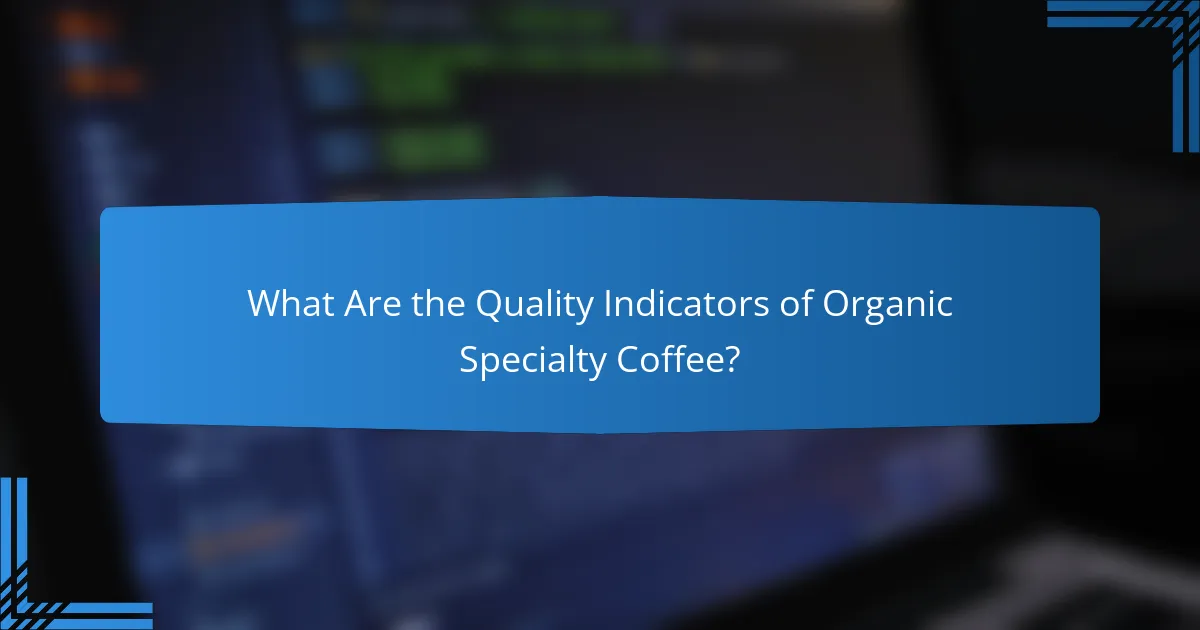When purchasing organic specialty coffee, it’s essential to consider various factors such as flavor profile, roast level, and origin, as these elements greatly impact your coffee experience. Certifications play a crucial role in ensuring the product meets specific agricultural and ethical standards, providing consumers with confidence in its quality and sustainability. Understanding quality indicators like grading scale, aroma, and body will further guide you in selecting the best options for your palate.

What Are the Key Factors in Buying Organic Specialty Coffee?
When buying organic specialty coffee, consider factors such as flavor profile, roast level, freshness, origin, and brewing method. Each of these elements significantly influences the overall quality and enjoyment of your coffee experience.
Flavor profile
The flavor profile of organic specialty coffee encompasses the unique tastes and aromas that distinguish one coffee from another. Factors such as the coffee bean variety, growing conditions, and processing methods contribute to its flavor. Look for tasting notes on the packaging, which may include hints of chocolate, fruit, or floral undertones.
When selecting coffee, consider your personal preferences. If you enjoy bright, fruity flavors, look for beans from regions known for these characteristics, such as Ethiopia or Kenya. Conversely, if you prefer a more earthy or chocolatey taste, beans from Colombia or Brazil may be more suitable.
Roast level
The roast level of coffee affects its flavor, aroma, and acidity. Coffee can be classified as light, medium, or dark roast, each offering distinct characteristics. Light roasts tend to preserve the original flavors of the bean, while dark roasts often have a bolder, smokier taste.
When choosing a roast level, consider how you plan to brew your coffee. For methods like pour-over or cold brew, a medium roast may provide a balanced flavor. For espresso, a darker roast can enhance the richness and crema.
Freshness
Freshness is crucial in maintaining the quality of organic specialty coffee. Coffee beans begin to lose their flavor shortly after roasting, so look for bags with a roast date rather than just an expiration date. Ideally, consume coffee within a few weeks of roasting for the best taste.
To ensure freshness, purchase coffee in smaller quantities that you can consume quickly. Store your beans in an airtight container, away from light and moisture, to preserve their flavor for as long as possible.
Origin
The origin of coffee refers to the region where the beans are grown, which can greatly influence their flavor and quality. Different countries and even specific farms produce beans with unique characteristics due to variations in climate, soil, and cultivation practices.
When selecting organic specialty coffee, consider exploring beans from various origins. For instance, Central American coffees often have a balanced flavor profile, while African coffees may offer brighter acidity and fruity notes. Understanding the origin can enhance your appreciation of the coffee you choose.
Brewing method
The brewing method you choose can significantly impact the final taste of your organic specialty coffee. Common methods include drip brewing, French press, espresso, and pour-over, each extracting flavors differently. Consider how each method interacts with the coffee’s characteristics.
For example, a French press allows for a fuller body and richer flavor, while a pour-over can highlight the coffee’s acidity and nuanced flavors. Experiment with different brewing techniques to find the one that best complements your chosen coffee’s profile.

How Do Certifications Impact Organic Specialty Coffee?
Certifications significantly influence the quality and perception of organic specialty coffee by ensuring adherence to specific agricultural and ethical standards. They provide consumers with assurance regarding the product’s organic integrity, sustainability practices, and fair treatment of farmers.
USDA Organic certification
The USDA Organic certification guarantees that coffee is grown without synthetic fertilizers, pesticides, or genetically modified organisms. To achieve this certification, farmers must adhere to strict guidelines, including maintaining organic soil health and biodiversity.
When purchasing USDA Organic coffee, look for the official seal on the packaging. This certification not only promotes environmentally friendly practices but also often results in higher-quality beans due to the focus on sustainable farming methods.
Fair Trade certification
Fair Trade certification ensures that coffee producers receive fair prices and are treated ethically. This certification promotes social and economic equity, allowing farmers to invest in their communities and improve their livelihoods.
When selecting Fair Trade coffee, check for the Fair Trade logo. This certification can lead to better quality coffee, as farmers are more likely to invest in their crops when they receive fair compensation. Additionally, it often supports community development projects.
Rainforest Alliance certification
The Rainforest Alliance certification focuses on sustainable farming practices that protect ecosystems and wildlife. This certification requires farmers to implement practices that conserve biodiversity and promote environmental stewardship.
Look for the Rainforest Alliance seal on coffee products to ensure that your purchase supports sustainable agriculture. This certification not only helps protect the environment but also often results in superior coffee quality, as farmers are encouraged to maintain healthy ecosystems for their crops.

What Are the Quality Indicators of Organic Specialty Coffee?
The quality indicators of organic specialty coffee include grading scale, flavor notes, aroma, and body. These factors collectively determine the overall experience and satisfaction of the coffee drinker, guiding consumers in selecting high-quality options.
Grading scale
The grading scale for coffee typically ranges from 1 to 100, with scores above 80 considered specialty grade. This scale evaluates various attributes including flavor, acidity, and aftertaste. Specialty coffee must meet strict criteria set by organizations like the Specialty Coffee Association (SCA).
When purchasing, look for coffees that have been rated by certified cuppers. A higher score often indicates superior quality, but also consider the specific characteristics that appeal to your palate.
Flavor notes
Flavor notes describe the distinct tastes that can be detected in coffee, such as fruity, nutty, or chocolatey. These notes arise from the coffee’s origin, processing method, and roast profile. Understanding flavor notes helps you choose coffee that aligns with your taste preferences.
Many specialty coffees will include tasting notes on their packaging. Familiarize yourself with common flavor descriptors to enhance your coffee selection experience.
Aroma
Aroma plays a crucial role in the overall coffee experience, as it significantly influences flavor perception. A high-quality organic specialty coffee will have a complex and inviting aroma, often described as floral, fruity, or earthy. The aroma can be assessed before brewing and during tasting.
To evaluate aroma, take a moment to smell the coffee grounds and brewed coffee. A rich and pleasant aroma is a good indicator of quality and freshness.
Body
The body of coffee refers to its weight and texture in the mouth, ranging from light to full. A coffee with a full body often feels creamy or syrupy, while a light body may feel more delicate. The body is influenced by factors such as the coffee bean type and brewing method.
When selecting organic specialty coffee, consider how the body complements the flavor and aroma. Experiment with different brewing techniques to find the body that suits your taste best.

How to Choose the Best Organic Specialty Coffee Subscription?
Choosing the best organic specialty coffee subscription involves considering factors like coffee variety, delivery frequency, and pricing options. These elements will help you find a service that meets your taste preferences and budget while ensuring quality and sustainability.
Variety selection
When selecting a coffee subscription, variety is crucial. Look for services that offer a range of coffee types, such as single-origin, blends, or flavored options, to keep your experience exciting. Many subscriptions allow you to customize your choices based on your flavor preferences, roast levels, and brewing methods.
Consider trying a subscription that provides a rotating selection of coffees from different regions. This not only enhances your palate but also supports diverse coffee-growing communities. Some popular origins include Ethiopia, Colombia, and Costa Rica, each offering unique flavor profiles.
Delivery frequency
Delivery frequency is another important factor in choosing a coffee subscription. Most services offer options ranging from weekly to monthly deliveries, allowing you to select a schedule that fits your consumption habits. If you drink coffee daily, a weekly delivery might be ideal, while occasional drinkers may prefer a monthly option.
Be mindful of how much coffee you typically consume to avoid waste. Some subscriptions allow you to pause or adjust your delivery frequency, which can be helpful if your coffee needs change seasonally or if you plan to travel.
Pricing options
Pricing for organic specialty coffee subscriptions can vary widely based on the quality and sourcing of the beans. Expect to pay anywhere from $15 to $30 per shipment, depending on the brand and coffee selection. Look for subscriptions that offer flexibility in pricing, such as discounts for longer commitments or bulk purchases.
Compare the cost per ounce of coffee across different subscriptions to ensure you’re getting good value. Some services may also offer free shipping, which can significantly affect the overall price. Always check for any hidden fees or cancellation policies before committing to a subscription.

What Are the Popular Brands of Organic Specialty Coffee?
Popular brands of organic specialty coffee include Blue Bottle Coffee, Stumptown Coffee Roasters, and Intelligentsia Coffee. Each brand is known for its commitment to quality sourcing, unique flavor profiles, and sustainable practices, making them favorites among coffee enthusiasts.
Blue Bottle Coffee
Blue Bottle Coffee is renowned for its meticulous sourcing and roasting practices, emphasizing freshness and flavor. The brand offers a range of organic specialty coffees, often featuring single-origin options that highlight the unique characteristics of their growing regions.
When purchasing Blue Bottle, consider their subscription service, which delivers freshly roasted coffee to your door. This ensures you always have access to high-quality beans while supporting sustainable farming practices.
Stumptown Coffee Roasters
Stumptown Coffee Roasters is a pioneer in the specialty coffee movement, known for its direct trade relationships with farmers. Their organic offerings often include blends and single-origin coffees that are carefully crafted to enhance flavor and aroma.
Look for Stumptown’s seasonal releases, which showcase the best beans from specific harvests. Their commitment to transparency in sourcing means you can feel good about your purchase, knowing it supports ethical practices.
Intelligentsia Coffee
Intelligentsia Coffee is celebrated for its focus on quality and sustainability, sourcing beans directly from farmers who practice organic methods. Their coffees are often roasted in small batches to ensure optimal flavor and freshness.
Consider trying Intelligentsia’s coffee tasting flights, which allow you to explore different flavor profiles and origins. This hands-on approach can enhance your appreciation for the nuances of organic specialty coffee.
